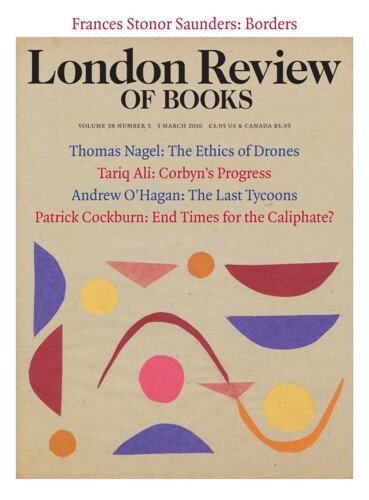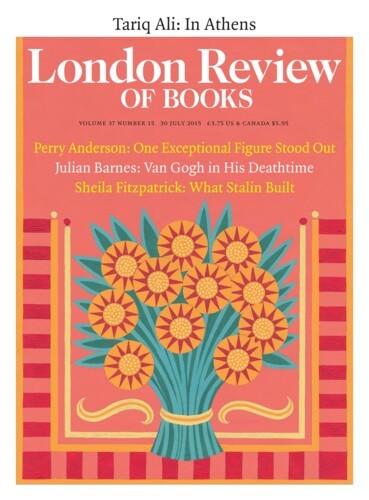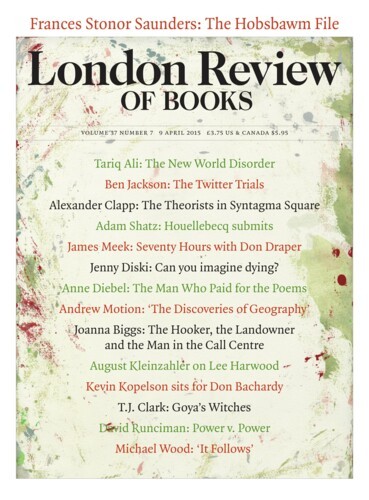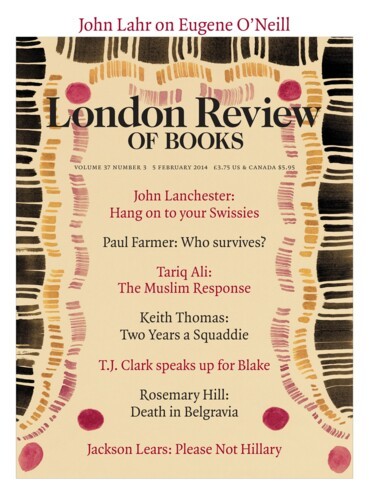Yet another manufactured crisis in Pakistan with a hard-line religious group at its core; the country’s political capital, Islamabad, cut off for over a fortnight from its twin military capital, Rawalpindi. The people laying siege are not too far from military GHQ. A whiff of grapeshot and they would have dispersed like rabbits. But the demonstrators were confident. The leaders were actually hoping for a few martyrs. The government did not oblige. Yesterday it capitulated in toto to the demands of the TLY, the Tehreek-i-Labaik Ya Rasool Allah (Movement to Obey the Prophet), a group set up two years ago in Karachi.
Tariq Ali
Tariq Ali is the author of many books, including Street-Fighting Years, Clash of Fundamentalisms: Crusades, Jihads and Modernity, The Dilemmas of Lenin and Winston Churchill: His Times, His Crimes. He is on the editorial committee of New Left Review. He has written more than fifty pieces for the LRB, on cricket, Pakistan, Afghanistan, Kashmir, Corbyn, the Bhuttos, Victor Serge and the conflicts of recent decades. He also discussed his political formation in an interview with David Edgar.
Corbyn’s Progress
Tariq Ali, 3 March 2016
The UK state – its economy, its culture, its fractured identities and party system – is in a much deeper crisis than many want to accept. Its governors, at least in public, remain in semi-denial. English politicians assumed that the threat to the unitary state had been seen off after they got the result they wanted in the Scottish independence referendum. The results of last...
Diary: In Athens
Tariq Ali, 30 July 2015
Why did Tsipras hold a referendum at all? ‘He’s so hard and ideological,’ Merkel complained to her advisers. If only. It was a calculated risk. He thought the ‘Yes’ camp would win, and planned to resign and let EU stooges run the government. The EU leaders launched a propaganda blitz and pressured the Greek banks to restrict access to deposits, warning that a ‘No’ vote meant Grexit. Tsipras’s acceptance of Varoufakis’s resignation was an early signal to the EU that he was about to cave in.
The New World Disorder
Tariq Ali, 9 April 2015
Three decades ago, with the end of the Cold War and the dismantling of the South American dictatorships, many hoped that the much talked about ‘peace dividend’ promised by Bush senior and Thatcher would actually materialise. No such luck. Instead, we have experienced continuous wars, upheavals, intolerance and fundamentalisms of every sort – religious, ethnic and...
‘It didn’t need to be done’: The Muslim Response
Tariq Ali, 5 February 2015
In the week following the atrocities, a wave of moral hysteria swept France. ‘Je suis Charlie’ became almost obligatory. The Hollande/Valls message was simple: either you were for the magazine or for the terrorists. Quite a few, now as in 2001, were for neither. These included Henri Roussel, the 80-year-old founder of Hara-Kiri, the title under which Charlie Hebdo was published...
Podcasts & Videos
Muhammad, Cervantes and the Algarve
Tariq Ali and Thomas Jones
Tariq Ali talks to Thomas Jones about a newly reissued biography of the Prophet by Maxime Rodinson, and the historic prevalence of Arabic culture in the West, from Don Quixote to Trafalgar Square.
Diary: In Pyongyang
Tariq Ali
Tariq Ali reads extracts from his diary about visiting Pyongyang.
The New World Disorder
Tariq Ali
Tariq Ali delivers his 2015 LRB Winter Lecture, in which he argues that we are living in the twilight period of democracy
Alexander Zevin talks to Tariq Ali about his new book, Liberalism at Large, a critical biography of the Economist magazine and an examination of liberalism.
Pieces about Tariq Ali in the LRB
Bad Times: Travels with Tariq Ali
Andy Beckett, 20 February 2025
For a lifelong opponent of the establishment, Tariq Ali gets on strikingly well with some of its members: those diplomats, spooks and former spooks who think seriously, as he sees it, about the arrangement...
Baseball’s Loss: The Unstoppable Hugo Chávez
Geoffrey Hawthorn, 1 November 2007
In Venezuela at the end of June, Evo Morales, Hugo Chávez and Diego Maradona, three heroes of the people in Latin America, kicked off the Copa América. Morales, pleased with his...
I prefer to be an Ottoman: Tariq Ali
Justin Huggler, 30 November 2000
No country in the Islamic world has embraced the West as eagerly as Turkey has, which makes it an intriguing setting for the third novel in Tariq Ali’s Islamic Quartet: a series of...
Acts of Violence in Grosvenor Square: Memoirs of a Revolutionary
Christopher Hitchens, 4 June 1998
I was just beginning to write about 1968 when I learned of the death in New Orleans of Ron Ridenhour, the GI who exposed the massacre at My Lai. He was only 52, which means that he was in his...
Here is a little family
Amit Chaudhuri, 9 July 1992
The narrator of After Silence is Max Fischer, the famous cartoonist. At the Los Angeles County Museum, where his work is on display, his life collides with that of Lily Aaron, a divorcee with a...
When students ruled the earth
D.A.N. Jones, 17 March 1988
Twenty years is a long time in politics. To me, the flavour of the year 1968 is still ‘anti-Fascism’. The meanings of ‘Fascism’ and ‘National Socialism’ are...
Read anywhere with the London Review of Books app, available now from the App Store for Apple devices, Google Play for Android devices and Amazon for your Kindle Fire.
Sign up to our newsletter
For highlights from the latest issue, our archive and the blog, as well as news, events and exclusive promotions.





